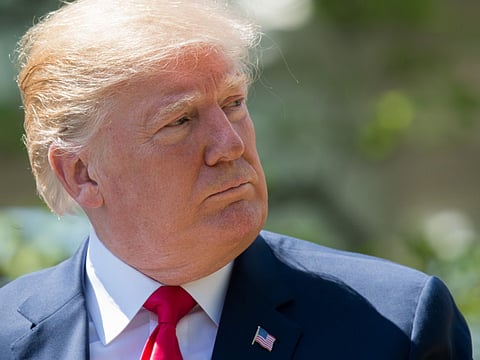To win a Nobel, Trump should look at Iran deal
A crazy-like-a-fox foreign policy may be working with North Korea, but he is far from securing a credible nuclear agreement

‘President Trump should win the Nobel Peace Prize.” It is hard to imagine anyone other than United States President Donald Trump expressing that sentiment. But the quote is from his South Korean counterpart, Moon Jae-in, citing Trump’s work to engineer talks between the two Koreas and the tantalising prospect of a long-sought peace and denuclearisation on the peninsula.
If Trump feels triumphant, he’s not without justification — for now. The dramatic images beamed around the world from Panmunjom — with the North Korean leader, Kim Jung-un, setting foot in the South for the first time since the war, smiling, holding hands with Moon and signing onto a broad peace declaration — owe something to Trump’s crazy-like-a-fox foreign policy. His administration smartly built on the economic pressure and isolation campaign initiated by former US president Barack Obama. Trump’s infamous “fire and fury” threat seems to have spooked Moon as much as it did Kim into redoubling efforts to avoid a pre-emptive military strike on North Korea that might unleash a devastating war. His swift agreement to meet Kim effectively raised the diplomatic ante.
It’s also true that North Korea’s remarkable progress over the past two years in developing an intercontinental nuclear weapon, coupled with a cave-in at its main testing site, allows Kim to press the pause button, de-escalate the tension he generated and go for the diplomatic high ground.
So, should Trump start taking seriously talk about a trip to Oslo? The long litany of aborted efforts in the past, the sheer complexity of any negotiations and the many traps along the way suggest not yet.
Twice before — in 2000 and 2007 — Seoul and Pyongyang made joint peace pledges that crashed on the rocks of North Korean aggression. The vague language of the two Korean leaders’ Panmunjom Declaration on denuclearisation falls well short of commitments that Pyongyang made — and then promptly violated — in 2005 and 2012. Despite Kim’s forward-leaning rhetoric, it is unlikely he is prepared to fully relinquish his nuclear arsenal, which he sees as his best insurance policy against regime change and a ticket to international recognition. The Kim family had long ago perfected the art of the steal: String out talks, wring out economic concessions and walk away from any commitments. Then, when Washington tightens the noose again, ratchet up tensions and repeat. It’s exactly this dynamic that Obama had refused to engage.
Even if this time it is the exception that breaks the rule and Kim is serious about denuclearisation, the road ahead is long, winding and all uphill.
Kim enters any talks with Trump from a position of strength. His charm offensive — ardently embraced by Moon — is quickly corroding Trump’s leverage. It takes the credible threat of a pre-emptive strike out of America’s arsenal; the world would not understand Trump resorting to force when Kim is talking peace. It is likely to weaken sanctions enforcement, with China and even South Korea looking to ease up on their neighbour. It buys time for Kim to keep tinkering with his bombs and missiles, albeit without the testing necessary to perfect them. The very fact of meeting with an American president conveys legitimacy to Kim that his father and grandfather sought but never secured.
Kim also scored a coup by getting Moon to put peace talks on a separate and faster track than denuclearisation. Previous American administrations held out the former as a reward for the latter. Trump will have to decide whether to countenance this reversal or risk a split with South Korea.
In the best-case scenario, we are only at the very beginning of a monumentally complex process that will require meticulous technical planning and sustained diplomacy — not exactly hallmarks of the Trump administration to date.
It took almost two years to negotiate the final nuclear accord with Iran, which, unlike North Korea, did not possess nuclear weapons. Trump is on the verge of scrapping the Iran deal. That would be a monumental mistake in its own right, giving Iranian hard-liners the excuse to speed toward a breakout nuclear capacity, but without a united international coalition to oppose them or inspectors to expose them.
It would also make getting to ‘yes’ with Pyongyang even more challenging. Iran is complying with the agreement. If Trump tears it up anyway, why would Kim trust anything Trump says or signs? And by scrapping the accord, Trump would set the bar almost impossibly high on any deal with North Korea, whose terms will have to be demonstrably better. Can Trump get Pyongyang to verifiably dismantle the vast bulk of its nuclear enterprise up front or accept the most intrusive inspections regime ever, as Obama did with Iran?
Instead of shredding the Iran accord, Trump should apply its basic template to North Korea. First, negotiate an interim deal that freezes Pyongyang’s programme in place and starts to roll it back, gets inspectors on the ground and offers modest, carefully measured economic relief. Then use the resulting time to produce a more comprehensive agreement, ideally to include denuclearisation and a peace treaty.
By some combination of accident and design, Trump has helped create a moment of opportunity in a place of enduring peril. If he keeps his eyes on the Nobel Prize, he may not make it to Oslo, but he could make the world a less dangerous place.
— New York Times News Service
Sign up for the Daily Briefing
Get the latest news and updates straight to your inbox


